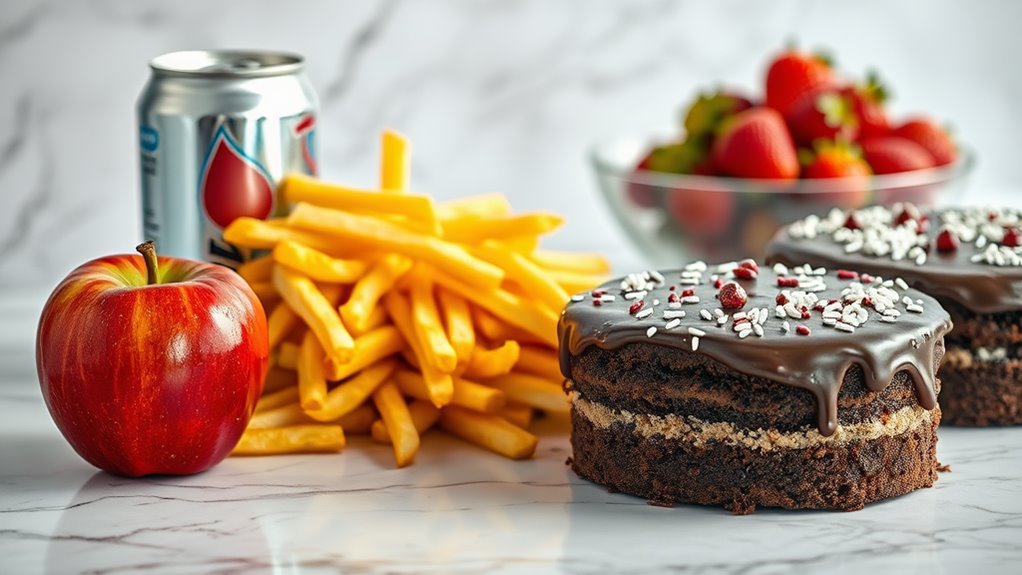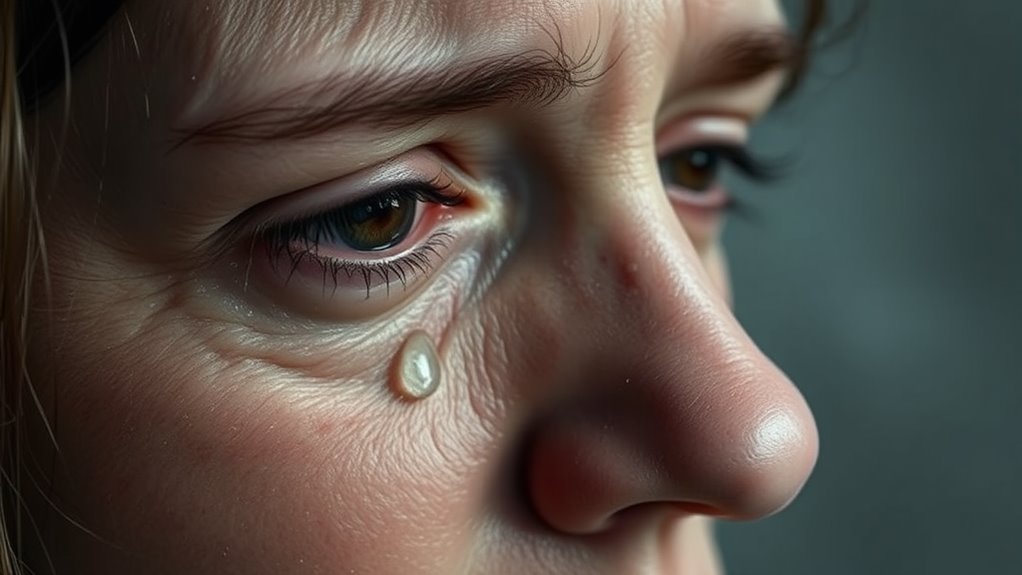These Foods Could Be Causing Your Skin to Break Out Right Now
Certain foods, like dairy products, sugar-laden snacks, and highly processed items, could cause your skin to break out. Dairy contains hormones that may increase oil production, while sugar spikes insulin levels, leading to inflammation. Fast food and refined carbohydrates can worsen these issues, contributing to clogged pores. Additionally, excessive salt can dehydrate skin, prompting more oil production. By understanding these dietary influences, you can take steps to improve your skin’s health and appearance. Discover more insights ahead.
Key Takeaways
- Dairy products, including milk and cheese, can increase insulin levels, stimulating oil production and worsening acne.
- High sugar and sugary foods lead to insulin spikes, promoting sebum production and inflammation, which can worsen skin conditions.
- Highly processed foods contain unhealthy fats and high sugar content that trigger inflammation and oil production, contributing to breakouts.
- Fast food and fried foods are rich in refined carbohydrates and unhealthy fats, causing increased insulin levels and clogged pores.
- Refined carbohydrates and excessive salt can lead to insulin spikes and dehydration, negatively impacting skin health and causing breakouts.
Dairy Products
[Dairy products, including milk, cheese, and yogurt, have been linked to skin breakouts in some individuals. These foods contain hormones and bioactive molecules that may exacerbate acne, particularly in those predisposed to skin conditions. Studies suggest that milk, especially skim milk, can increase insulin levels, which in turn stimulates sebum production and promotes acne development. Furthermore, the growth factors present in dairy may contribute to the proliferation of acne-causing bacteria. If you notice a correlation between your dairy consumption and breakouts, consider eliminating these acne-triggering foods from your diet. Monitor your skin’s response to identify potential triggers and consult with a dermatologist for a tailored approach to managing your skin health effectively. Additionally, research indicates that insulin levels can be significantly affected by dairy consumption, further linking these foods to acne formation.
Sugar and Sugary Foods
When you consume sugar and sugary foods, your body experiences a spike in insulin levels, which can lead to increased sebum production and contribute to acne development.
Elevated insulin stimulates androgen hormones, further enhancing oil production in your skin. This excess oil can clog pores, creating an environment for acne-causing bacteria to thrive.
Moreover, high sugar intake can cause inflammation, exacerbating skin conditions.
You’ll also find that sugary foods often lack essential nutrients, which are vital for skin health.
To minimize breakouts, consider reducing your sugar consumption and opting for low-glycemic-index alternatives.
Interestingly, studies have shown that high sugar intake is linked to a higher prevalence of acne among adolescents and young adults.
Balancing your diet with whole foods rich in vitamins and antioxidants supports skin clarity and overall health, promoting a clearer complexion.
Highly Processed Foods
Highly processed foods often contain high sugar content, unhealthy fats, and various artificial additives, all of which can trigger skin breakouts. When you consume these foods, your body may respond negatively, leading to inflammation and acne. Understanding the impact of these ingredients can help you make better dietary choices for clearer skin. Additionally, certain common foods you may not realize, such as refined carbs and dairy, can also contribute to acne flare-ups.
High Sugar Content
While many factors contribute to skin breakouts, the high sugar content found in highly processed foods is a significant culprit. Consuming excessive sugar can lead to increased insulin levels, triggering inflammation and oil production, which often results in acne.
To better understand this connection, consider the following:
-
Sugary Beverages: Sodas and energy drinks can spike blood sugar rapidly.
-
Candy and Sweets: High fructose corn syrup and refined sugars are prevalent.
-
Refined Carbohydrates: White bread and pastries convert to sugar quickly in the body.
-
Snack Foods: Chips and packaged snacks often contain hidden sugars.
Unhealthy Fats
Numerous studies indicate that unhealthy fats found in highly processed foods can significantly impact skin health, contributing to breakouts.
These fats, often present in fried foods, baked goods, and fast foods, promote inflammation in your body. When inflammation occurs, your skin’s oil production can increase, clogging pores and leading to acne.
Additionally, trans fats and saturated fats can disrupt hormonal balance, further exacerbating skin issues. By incorporating healthier fats, such as omega-3 fatty acids from fish or avocados, you can combat these adverse effects.
Reducing your intake of processed foods rich in unhealthy fats not only supports your overall health but can also lead to clearer, healthier skin.
Make conscious dietary choices to enhance your skin’s vitality.
Artificial Additives
Artificial additives in highly processed foods can wreak havoc on your skin, often leading to breakouts and irritation.
These substances can disrupt your hormonal balance and trigger inflammatory responses.
Here are four common artificial additives to watch out for:
-
Artificial Sweeteners – These can alter gut microbiota, potentially causing skin issues.
-
Preservatives – Often linked to skin sensitivities and allergic reactions.
-
Coloring Agents – Synthetic dyes may provoke inflammation and exacerbate acne.
-
Flavor Enhancers – Ingredients like MSG can lead to skin flare-ups.
Fast Food and Fried Foods
Fast food and fried foods can significantly impact your skin health due to their high levels of unhealthy fats and refined carbohydrates.
These foods often lead to increased insulin levels, which can trigger the production of sebum and contribute to clogged pores. The excessive consumption of omega-6 fatty acids found in many fried products can also promote inflammation, exacerbating conditions like acne.
Additionally, the glycemic index of fast foods can lead to rapid spikes in blood sugar, further aggravating skin issues. If you’re aiming for clearer skin, it’s essential to limit your intake of these foods. Unexpected factors may also play a role in your acne, so it’s important to consider all aspects of your diet and lifestyle.
Instead, opt for whole, unprocessed options rich in antioxidants and healthy fats, which can better support your skin’s health and overall well-being.
Chocolate
When you enjoy chocolate, it’s important to consider its sugar content, which can trigger insulin spikes and lead to increased oil production in your skin.
Additionally, if you’re consuming milk chocolate, the dairy may exacerbate acne for some individuals. Understanding these connections can help you make informed choices about your chocolate intake. Furthermore, avoiding mistakes for oily skin can lead to a healthier complexion by reducing breakouts and balancing oil levels.
Sugar Content Impact
Studies reveal that high sugar content in chocolate can significantly impact your skin health. Consuming chocolate with elevated sugar levels may lead to various skin issues due to its influence on insulin levels and inflammation.
It’s crucial to be mindful of the sugar content in your chocolate choices. Consider the following:
-
Insulin Surge: High sugar spikes insulin, potentially leading to increased oil production.
-
Inflammation: Sugar can trigger inflammatory responses, worsening acne.
-
Glycation: Excess sugar can damage collagen and elastin, leading to premature aging.
-
Bacterial Growth: High sugar levels can create an environment conducive to acne-causing bacteria.
Dairy Connection Explained
While many enjoy chocolate for its rich flavor, the dairy content in some varieties may contribute to skin breakouts.
Dairy, particularly in the form of milk chocolate, contains hormones and bioactive compounds that can trigger inflammation and increase oil production in your skin. This process can lead to clogged pores and subsequent acne formation.
If you’re sensitive to dairy, even small amounts may exacerbate these issues. Additionally, the sugar content in chocolate can further aggravate inflammation, compounding the problem.
To assess your skin’s reaction, consider substituting dark chocolate with low dairy content or dairy-free options. Monitoring your skin’s response can help you identify potential triggers and maintain clearer skin.
Whey Protein
Whey protein, a popular supplement among fitness enthusiasts, can contribute to skin breakouts in some individuals. This is primarily due to its dairy origins, which can trigger acne in sensitive individuals.
Here are four reasons whey protein might affect your skin:
-
Hormonal Fluctuations: Whey can increase insulin levels, leading to an uptick in oil production.
-
Growth Factors: It contains IGF-1, which may stimulate sebaceous glands and promote acne.
-
Inflammation: Some individuals may experience inflammatory responses to dairy proteins.
-
Digestive Issues: If your body struggles to digest whey, it may manifest as skin problems.
If you notice a correlation between whey protein intake and breakouts, consider adjusting your diet accordingly.
Refined Carbohydrates
Dietary choices play a significant role in skin health, and refined carbohydrates are another category that can contribute to breakouts. Consuming high-glycemic foods like white bread and pastries can trigger insulin spikes, leading to increased oil production and clogged pores. This process can exacerbate acne conditions.
| Food Type | Glycemic Index | Skin Impact |
|---|---|---|
| White Bread | 75 | Increases insulin levels |
| Sugary Cereals | 70 | Promotes inflammation |
| Pastries | 85 | Clogs pores |
| Instant Rice | 73 | Triggers breakouts |
To maintain optimal skin health, focus on complex carbohydrates like whole grains and legumes instead, which provide sustained energy without causing insulin surges.
Excessive Salt
Excessive salt intake can significantly impact your skin health and may contribute to breakouts. High sodium levels can lead to dehydration, prompting your body to retain water, which may exacerbate skin issues.
When your skin is dehydrated, it can produce more oil, leading to clogged pores and acne. To mitigate these effects, consider reducing your salt consumption by focusing on:
- Fresh fruits and vegetables, which are naturally low in sodium.
- Whole grains, avoiding processed options that often contain added salt.
- Lean proteins, such as chicken or fish, without salty marinades or sauces.
- Homemade meals, where you can control the amount of salt used.




